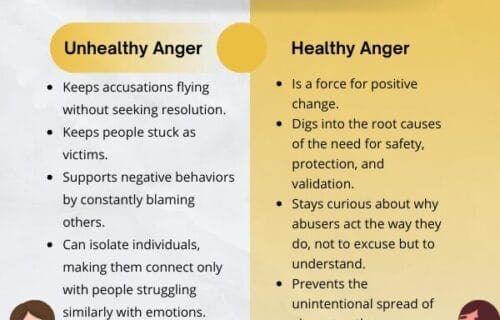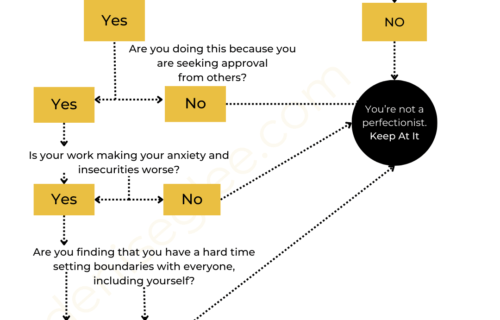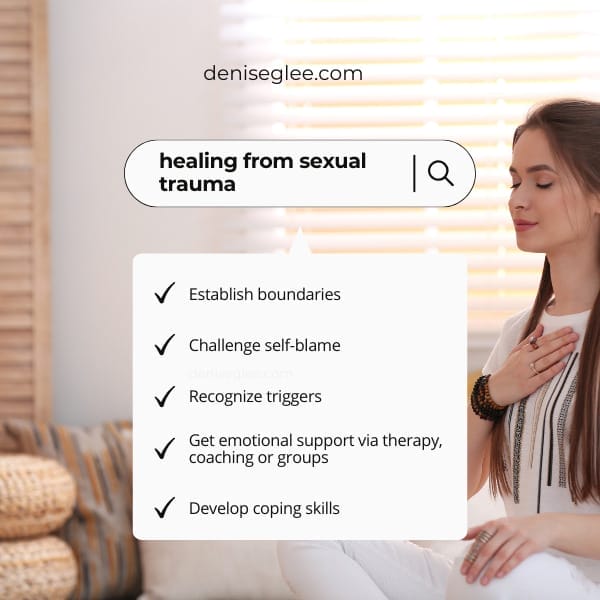
The Lasting Effects of Sexual Abuse: Healing and Moving Forward
As a life and business coach, I help business owners deal with tough issues that might affect their mental health.
One important issue is how early sexual abuse or assault might make people more likely to be sexually active later on. This is a pattern that has been studied for a long time and is still important to think about today.
Whether it’s stuff that happened a while ago or things that just happened, bad experiences can affect how we act later. In this article, we’ll talk about how past trauma is connected to sex and how you can get better after going through it.
When someone has been sexually abused at a young age, they might become extra sensitive to sexual feelings. This could make them crave those feelings again, even if it's not safe or good for them.
Denise G. Lee Tweet
How a horrific experienced impacts the mind
Consider a horrific scenario where marauders storm a village, perpetrating devastating acts by killing men, setting properties ablaze, and subjecting women to sexual assault. The surviving children bear witness to these horrors, setting the stage for profound and long-lasting effects on their psychological and emotional well-being.
Trauma, especially of a sexual nature, induces profound alterations within a child’s body and mind. The intense stimulation experienced during such events can permanently alter the brain’s neurochemistry. Specifically, the neurotransmitter receptors for dopamine and norepinephrine become hardwired to seek the kind of stimulation associated with sexual activity due to the overwhelming nature of the initial traumatic experience.
Search for the same “high”
When someone has been sexually abused at a young age, they might become extra sensitive to sexual feelings. This could make them crave those feelings again, even if it’s not safe or good for them. This is why some people who’ve gone through sexual abuse might end up having multiple sexual partners or being careless during sexual experiences.
You don’t even have to be molested to be violated sexually
- The adult touches themselves provocatively in front of the child.
- Discusses sexually explicit material around them.
- Allows or encourages them to witness sexual intercourse.
- Comments on the size of their genitalia or breasts.
All these type of actions create an “assault” on their nervous system. And if this abuse not addressed as soon as possible, it can leave a permanent psychological scar on the child.
Later on, we’ll talk about studies that prove this connection.
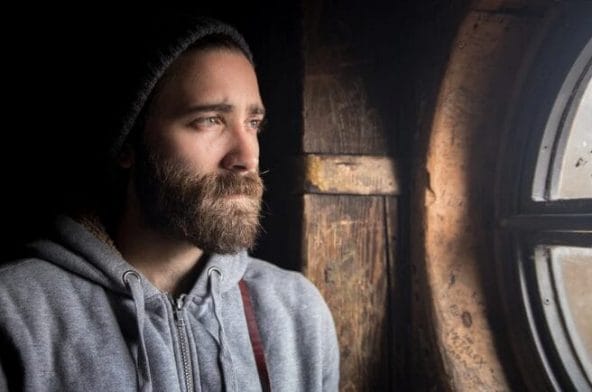
Studies connecting sexual abuse with promiscuous behavior
Scientists have been investigating the link between childhood sexual abuse and promiscuous sexual behavior. Two studies, one by Senn, Carey, and Vanable, called “Characteristics of Sexual Abuse in Childhood and Adolescence Influence Sexual Risk Behavior in Adulthood” and the other by Lalor and McElvaney, called “Child Sexual Abuse, Links to Later Sexual Exploitation/High-Risk Sexual Behavior, and Prevention/Treatment Programs,” focused on how childhood sexual trauma affects a person’s sexual behavior in adulthood.
These studies discovered that people who experienced childhood sexual abuse are more likely to engage in risky sexual behavior later in life, such as having many partners and finding it hard to maintain close relationships. In addition, they show how early traumatic experiences can influence someone’s sexual behavior even into adulthood.
By understanding these findings, therapists and healing professionals like myself can provide more personalized programs to help survivors of childhood sexual abuse in developing healthier sexual behaviors and relationships in adult life. In simpler words, there is no on-size-fits-all solution for survivors of sexual assault.

Just because you were sexually abused, doesn’t guarantee you will or are sexually promiscuous
Just because two things seem to happen together doesn’t always mean one caused the other. Not everyone who experienced sexual abuse as a kid will be really active sexually later on. Some might even avoid any kind of sexual activity at all.
Everyone handles tough experiences differently, so it’s hard to say for sure how early sexual abuse connects to being promiscuous. It’s important to respect each person’s own story.
To help those who’ve been through this kind of trauma heal and get better, we need to really understand how it all fits together. The next part has some ideas to help with healing from childhood sexual abuse.
How to heal from past sexual abuse
To get better after sexual assault or abuse, you need help from both others and yourself.
This is a team effort: you need both group support and time alone to work through the feelings of shame. If you don’t deal with that shame, it can lead to more problems and hurt.
Let’s first talk about getting help from others, and then I’ll mention things you can do on your own.

Two Ways to Heal Inside (External Healing Strategies)
Similar to fungi and bacteria, trauma thrives in dark and secret places. We need to voice all those pain-filled memories in a safe environment. Here are some places that can support you in sharing your trauma.
1. Professional Therapy
Just like you visit a doctor to treat a physical illness, you may need support from a professional who understands how trauma can impact the mind. Consider speaking with a therapist, counselor, or psychologist who specializes in trauma and abuse.
I highly recommend Eye Movement Desensitization and Reprocessing (EMDR) therapy and other trauma-focused therapies to help process and overcome past sexually traumatic experiences.
2. Support Group
Participating in support groups or connecting with others who have experienced similar trauma can offer a sense of community, understanding, and validation.
Sharing experiences and coping strategies with individuals who can relate may aid in the healing process. You may consider a spiritual support group like Celebrate Recovery or Codependents Anonymous, which can help you learn how to live a joy-filled life after abuse.
Group/private therapy and coaching is not enough
Even with this work, you still need to do internal healing work. This is important because our shame often compels us to avoid addressing internal issues that perpetuate the pain caused by trauma.
To be completely honest, in the beginning of my recovery journey, I relied on others to shoulder my emotional burdens and failed to do the inner work myself. It is essential to remember that the external work listed above should serve as a motivator to continue your own inner work. The following section will address the internal healing work that must be done.
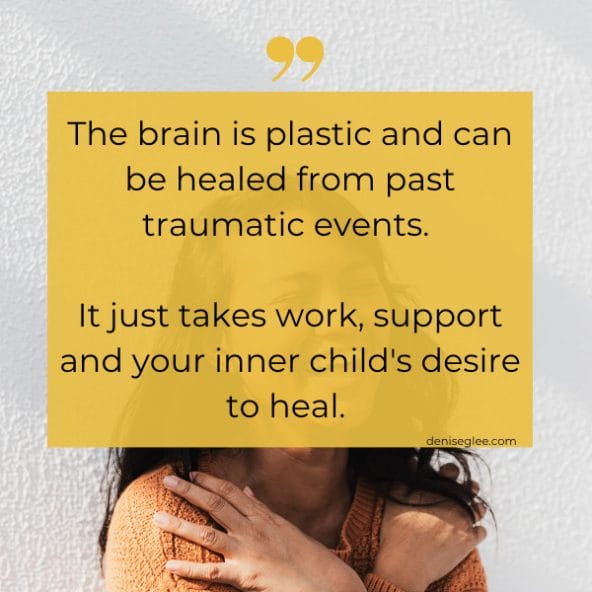
Six Ways to Heal Inside (Internal Healing Strategies)
An abuser doesn’t just harm us physically, they also take away our sense of rights and self-care. Learning to love yourself may seem foreign if you spent years, if not decades denying your right to feel safe and loved. Here are some ways to support yourself post-abuse/trauma.
1. Develop coping strategies
Learn healthy coping mechanisms to manage emotional distress. Breathing exercises, journaling, creative expression, or mindfulness techniques can help regulate emotions and reduce anxiety.
2. Understand and accept your feelings
Allow yourself to experience and process a wide range of emotions. It’s normal to feel anger, sadness, fear, or confusion. Acknowledging and accepting these feelings is an essential part of healing.
Keep taking small steps forward to reach a better future. Believe in your abilities, focus on moving forward steadily, and never give up. You are capable of healing and becoming stronger than ever before.
Denise G. Lee Tweet
3. Recognizing your triggers
When something really bad happens, it messes up how your body reacts to stuff. Your brain, especially the part that’s really basic and instinctual, remembers all the bad stuff and tries to protect you from it happening again. That’s why certain things, like sights, sounds, or smells, can make you remember bad experiences.
You might not even know why you feel uncomfortable around certain things or people, and that’s okay.
Healing from trauma takes time, and part of it is getting used to things that make you feel scared or upset. This helps you calm down and feel less on edge.
4. Challenge self-blame
Many survivors of childhood sexual assault may grapple with feelings of self-blame or shame. It’s important to understand that the fault lies with the perpetrator, not the survivor.
5. Be patient with yourself
Healing from childhood sexual assault is a gradual process. It’s important to be patient and compassionate with yourself throughout the journey. Healing doesn’t follow a linear path, and progress may fluctuate.
6. Create boundaries to keep yourself feeling safe
It’s really important to have rules in your personal relationships and stick to them. Make sure you tell people what your rules are and be firm about them, especially if something makes you feel uncomfortable or upset.
Below are some ways I like to feel better. Then, I’ll share my last thoughts.
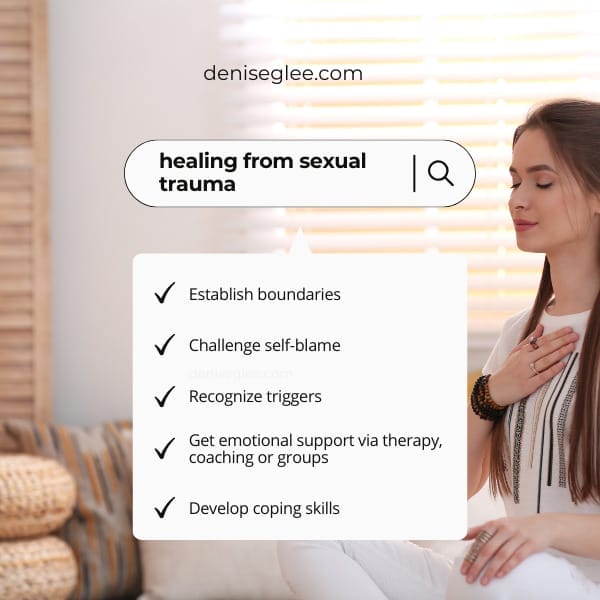
Final thoughts
Getting better after going through sexual abuse as a kid and dealing with the behaviors it might cause needs patience and support. Everyone’s journey to feeling better is unique, so it’s important to talk to people who know how to help.
The main aim isn’t to pretend like nothing bad happened, but to learn ways to handle it and move forward in a healthier way. That means finding ways to deal with tough feelings and live a good life despite what happened in the past.
If you’re already working on healing, I’m here to help. Don’t hesitate to contact me or listen to my podcast.
If you want to know more about how trauma affects mental health, listen to this podcast episode with EMDR Therapist Lisha Song.


